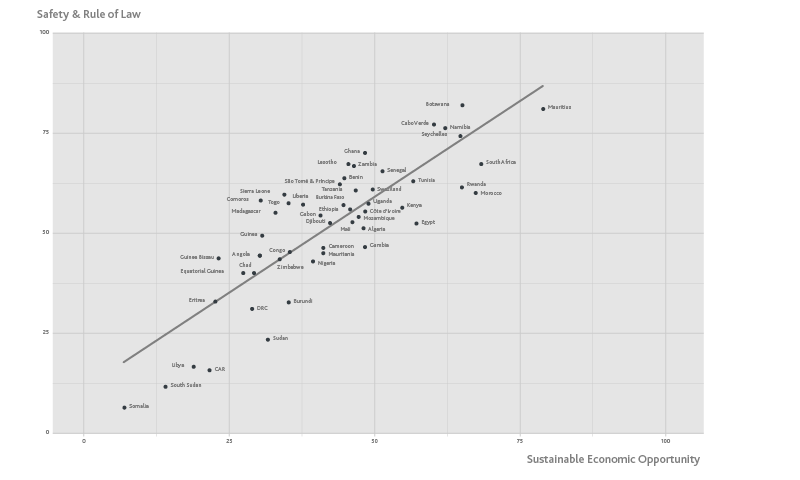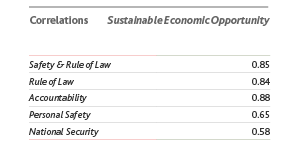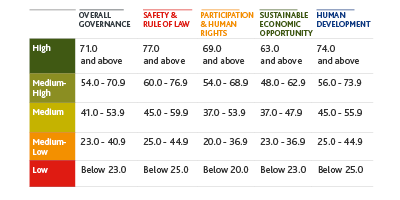Safety and Rule of Law and Sustainable Economic Opportunity: a strong correlation
20 October, 2016
There is a close relationship between Safety & Rule of Law and Sustainable Economic Opportunity: countries which score highly in one of these dimensions tend to perform well in the other. Over the past ten years, these categories have a high correlation (r = 0.85), the highest between any two categories within the 2016 IIAG. This would imply that countries which are free of conflict, protect the safety of their citizens and uphold rule of law are more likely to provide the conditions necessary for the pursuit of economic opportunities that contribute to a prosperous and equitable society. This correlation is particularly strong in countries such as Seychelles, Ethiopia, Djibouti, Congo, Zimbabwe, Chad and Eritrea.
Countries which are free of conflict, protect the safety of their citizens and uphold rule of law are more likely to provide the conditions necessary for the pursuit of economic opportunities
Conflict can be both a cause and a symptom of low scores in the economic dimension of the IIAG. Indeed, countries in which there are ongoing conflicts, or where there have been in the recent past, such as Libya, South Sudan, Central African Republic and Somalia, register low scores in Sustainable Economic Opportunity.

However, if we delve deeper into country performance in these two categories, at the sub-category level, the strongest correlations with Sustainable Economic Opportunity are in Accountability and Rule of Law (r=0.88 and 0.84 respectively). This would imply that there is a strong association between countries with transparent and accountable governments, which uphold rule of law, and economic prosperity. Comparatively, the sub-categories which measure security issues – Personal Safety and National Security – have a lower correlation with the economic dimension of the IIAG (r=0.65 and 0.58 respectively).
Ideally, a country should make balanced progress across all of the four categories
While conflict will inevitably impact the pursuit of economic gains, focusing on strengthening rule of law, which measures judicial integrity and transfers of power, and accountability, which measures transparency and the absence of corruption, may have a stronger impact on further progress in this dimension.

Ideally, a country should make balanced progress across all of the four categories. Governments are faced with diverse challenges, with differences existing between and within countries. However, in the long run, prioritising one dimension over another may lead to imbalance and prove unsustainable. One way to look at balanced governance is to compare a country’s performance in category bands, which place countries into five groups based on their score.
There is a strong association between countries with transparent and accountable governments, which uphold rule of law, and economic prosperity
If there is a large difference in band placement across dimensions it can be considered imbalanced. Morocco, for example, registers imbalance between Safety & Rule of Law and Sustainable Economic Opportunity. The country features in the highest band in the economic dimension but registers in the middle band in the safety and rule of law dimension. While Nigeria has moved up a band in Sustainable Economic Opportunity over the past decade, it has fallen a band in Safety & Rule of Law, illustrating imbalanced progress. These may point to potential obstacles, or even warning signs, blocking further progress in these categories.



